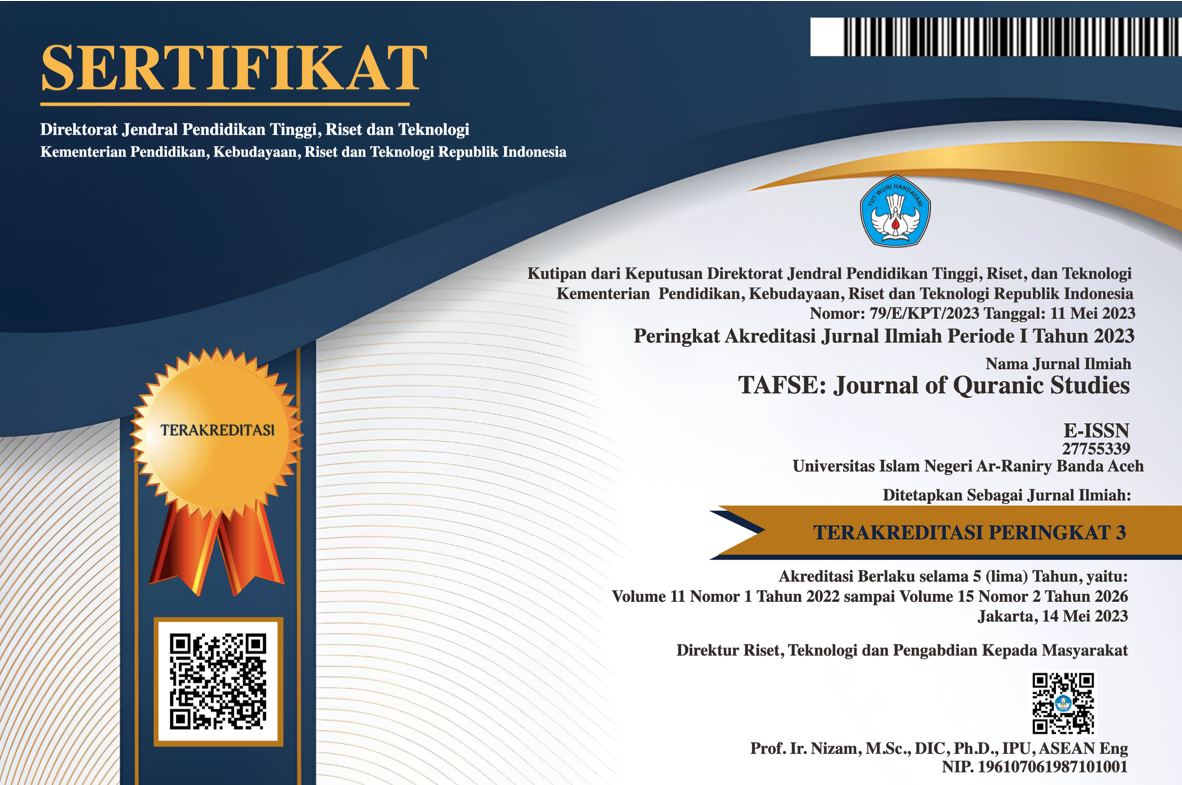Penafsiran Ayat-Ayat Takdir dalam Al-Qur’an
DOI:
https://doi.org/10.22373/tafse.v5i1.12579Keywords:
Tafsir, Takdir, Al-Qur’anAbstract
Muslims throughout history have been divided into three groups in the understanding of fate: groups that are excessive, groups that deny, and groups that are moderate. In strengthening the argument in the debate, each group uses the verses of the Qur'an incompletely. Resulting in contradiction of verses. This is the problem that the author raises in this study, by reviewing three books of Tafsir. The methods used are mauḍhūʻi and muqarān methods, with the type of qualitative research of literary objects. The research aims to determine the interpretation of the verses of fate in the Qur’an according to Tafsīr al-Ṭabarī, fī Ẓilāl al-Qur’an, and al-Miṣbāḥ. According to Tafsīr al-Ṭabarī, fate is an absolute provision that has been written in Lauḥ Mahfūz, whether in the form of good or bad. But with the perseverance of worship, the provisions or fate in Lauh Mahfuz can be changed. According to the fī Ẓilāl of the Qur’an, human fate is supernatural therefore man must strive in all his deeds even if the end result is determined by Allah. According to Tafsīr al-Miṣbāḥ, human beings are in the fate of Allah which have certain dimensions. So that God commands human beings to choose based on the potential of the intellect that has been bestowed by Him. The author understands that fate is everything that has been written in Lauḥ Mahfūz. But this does not mean that human beings should ignore the ability of the intellect that has been bestowed by God.
Umat Islam dalam sepanjang sejarah terbagi menjadi tiga kelompok dalam memahami takdir: kelompok yang berlebihan, kelompok yang mengingkari, dan kelompok yang bersikap pertengahan terhadap takdir. Untuk menguatkan argumen dalam berdebat, masing-masing menggunakan dalil al-Qur’an secara tidak utuh. Sehingga ayat-ayat tersebut terlihat seakan-akan bertentangan. Permasalahan inilah yang penulis angkat di dalam penelitian ini, dengan mengkaji dari tiga kitab Tafsir. Metode digunakan adalah metode mauḍhūʻi dan muqarān, dengan jenis penelitian kualitatif objek kepustakaan. Penelitian bertujuan untuk mengetahui penafsiran ayat-ayat takdir di dalam al-Qur’an menurut Tafsīr al-Ṭabarī, fī Ẓilāl Al-Qur’an, dan al-Miṣbāḥ. Menurut Tafsīr al-Ṭabarī, takdir adalah ketentuan mutlak yang telah tertulis di Lauḥ Mahfūz, baik berupa kebaikan atau keburukan. Namun dengan ketekunan beribadah ketentuan atau takdir di Lauh Mahfuz dapat saja berubah. Menurut fī Ẓilāl Al-Qur’an, takdir manusia bersifat ghaib karena itu manusia harus berusaha dalam segala perbuatannya meskipun hasil akhir ditentukan oleh Allah. Menurut Tafsīr al-Miṣbāḥ, manusia berada dalam takdir-takdir Allah yang memiliki ukuran-ukuran tertentu. Sehingga Allah menyuruh kepada manusia untuk memilih berdasarkan potensi akal yang telah di anugerahkan-Nya. Penulis memahami bahwa, takdir adalah segala sesuatu yang telah tertulis di Lauḥ Mahfūz. Namun bukan berarti manusia harus mengabaikan kemampuan akal yang telah dianugerahkan oleh Allah.
Downloads
References
Abbas, Siradjuddin. 40 Masalah Agama. 25th ed. Jakarta: Pustaka Tarbiyah, 2006.
Al-Farmawi, Abd. Al-Hayy. Metode Tafsīr Mauḍū’i, Terj. Suryan A. Jamrah. 2nd ed. Jakarta: PT Raja Grafindo Persada, 1996.
Al-Fauzan, Shalih bin Fauzan. Kitab Tauhid, Terj. Syahirul Alim Al-Adib. Edited by Tim Editor Ummul Qura. Solo: Ummul Qura, 2012.
Al-Maidani, Abdurrahman Hasan Habanakah. Pokok-Pokok Akidah Islam, Terj. A.M. Basalamah. Jakarta: Gema Insani Press, 1998.
Al-Qattan, Manna’ Khalil. Studi Ilmu-Ilmu Qur’an, Terj. Mudzakir AS. 13th ed. Bogor: Lintera Antar Nusa, 2009.
Al-Ṭabarī, Abī Jaʻfar Muḥammad bin Jarīr. Jāmiʻ Al-Bayān ‘an Ta’wīl Ay Al-Qur’ān. Beirut: Dar al-Fikr, 2005.
Al, Abdul Majid az-Zindani et. Mukjizat Alqur’an Dan as-Sunnah Tentang Iptek. Edited by Hidayat Tri Sudardjo Iwan Kusuma Hamdan, Tamsil Linrung. 1st ed. Jakarta: Gema Insani Press, 1997.
Anwar, Rosihon. Ilmu Tafsir. Bandung: Pustaka Setia, 2005.
Bahjat, Ahmad. Mengenal Allah: Risalah Baru Tentang Tauhid, Terj. Muhammad Abdul Ghoffar. 4th ed. Bandung: Pustaka Hidayah, 2001.
Bahri, Samsul. Tuntunan Akidah Untuk Pelajar. Edited by Hasnul Arifin Melayu. Banda Aceh: Dinas Syari’at Islam Aceh, 2011.
Hamid, Syamsul Rijal. Buku Pintar Agama Islam; Edisi Senior. 14th ed. Jakarta: Cahaya Salam, 2003.
Louis Ma’luf, Bernard Totel al-Yassul. Al-Munjid. Beirut: Dar el-Macreq Sarl, 1986.
Mustofa, Agus. Mengubah Takdir. Surabaya: Padma press, 2008.
Nasution, Harun. Teologi Islam; Aliran-Aliran Sejarah Analisa Perbandingan. 5th ed. Jakarta: Universitas Indonesia, 1986.
Quṭb, Sayyid. Tafsīr Fī Ẓilāl Al-Qur’ān: Di Bawah Naungan Al-Qur’an, Terj As’ad Yasin Dkk. 1st ed. Jakarta: Gema Insani Press, 2003.
Shihab, M. Quraish. Tafsīr Al-Miṣbāḥ: Pesan, Kesan, Dan Keserasian Al-Qur’an. Jakarta: Lentera Hati, 2002.
Waly, Muhibbuddin. Hakikat Hikmah Tauhid Dan Tasauf (Al-Hikam). Singapura: Pustaka Nasional Pte Ltd, 2004.
Zed, Mestika. Metode Penelitian Kepustakaan. Jakarta: Yayasan Obor Indonesia, 2004.
Downloads
Published
Issue
Section
License
Authors who publish with this journal agree to the following terms:
- Authors retain copyright and grant the journal right of first publication with the work simultaneously licensed under a Creative Commons Attribution License (CC BY NC 4.0) that allows others to share the work with an acknowledgment of the work's authorship and initial publication in this journal.
- Authors are able to enter into separate, additional contractual arrangements for the non-exclusive distribution of the journal's published version of the work (e.g., post it to an institutional repository or publish it in a book), with an acknowledgment of its initial publication in this journal.
- Authors are permitted and encouraged to post their work online (e.g., in institutional repositories or on their website) prior to and during the submission process, as it can lead to productive exchanges, as well as earlier and greater citation of published work (See The Effect of Open Access).





